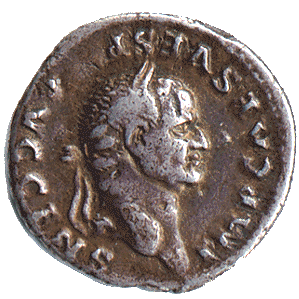 Contents --
Previous Article --
Next Article
Contents --
Previous Article --
Next Article
Vespasian was a likable old rogue, and one of the most human of all the Roman emperors. He appreciated a good joke, even when he was the butt of it. Suetonius tells us that he never had an innocent man punished, and even wept for condemned criminals when it was necessary that they be executed. He was an old soldier, and would often show kindness to other old soldiers. His father was a tax collector, and Vespasian himself had to become a mule driver after he was banished from Nero's court after having fallen asleep during one of Nero's performances. Later, Nero made him a general and put him in command of an army sent to put down a revolt in Judea. When Vespasian became emperor his son Titus replaced him as general in Judea and finally put down the revolt in A.D. 70 with the tragic destruction of the temple in Jerusalem.
Vespasian had many friends and supporters. During the reign of Vitellius, the dissatisfied troops under Vespasian's command proclaimed him emperor. Two thousand of Otho’s troops and the Prefect of Egypt threw their support behind him. Vesapasian arrived in Rome to find Vitellius already dead. He ascended the throne but was not quick to heap honors upon himself, waiting until late in his reign to assume the title PATER PATRIAE, or "Father of his Country." One of his few faults was greed. The treasury was depleted after the period of civil war and Vespasian calculated that 400 million gold aurei were needed to put the government’s finances in order. He increased tribute and inheritance taxes. He charged money for appointments to government office and favorable court judgments. He even collected a tax on the products of public urinals, which was used in the hat maker's trade at the time. When his son Titus complained about this method of raising money, Vespasian handed him a silver denarius. "Does this smell?" he asked. One of the strange things about his personality is that he could be so grasping in his business deals but also very generous to people who were down on their luck.
He was never ashamed of the fact that he was the son of a common man, unlike all the emperors before him who had come from aristocratic families. People occasionally made fun of his Latin pronunciation, and he would sometimes just turn the joke around on them. One day he asked a famous comedian, "Why don't you make a joke about me?" Since Vespasian usually had a strained expression on his face, the comic replied, "I will, as soon as you’re finished going to the bathroom!" Most other emperors would have had the man's head, but Vespasian just took it all in stride.
One famous example shows how much he really did care for the ordinary Roman citizen. An engineer had come up with an ingenious method for moving some heavy stone columns being used in the construction of a public building. "I must always make sure that there is enough work for my laboring classes to make a living," he replied and decided to employ laborers instead. Nevertheless, Vespasian thanked the man and rewarded him handsomely. Vespasian died on June 23, A.D. 79 after a short illness. As he was at the point of death, he struggled to stand up, saying that an emperor should die on his feet. He even made a joke about his own death. It was the custom to consecrate popular emperors after their deaths, declaring them a minor god. Vespasian was heard to say as he was about to expire, "Oh my, I fear I am about to become a god!"
Go to next article on Emperor Titus
Go back to previous article on Emperor Vitellius